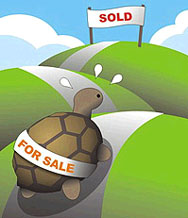Housing Slump Continues To Grow genre: Econ-Recon & Six Degrees of Speculation

There are increasing signs that a housing slump may become the leading factor in pushing the United States economy into a recession. The impact of lower housing starts and the large inventory of unsold homes garner the bulk of the attention at the moment, but should the slowdown continue the focus may well shift to lending practices that may well accelerate the economic impact of a housing slump. Specifically, it appears that the number of loans that are either interest only, adjustable rate, or funded at full value or in some instances at 125% may trigger an unprecedented wave of foreclosures and bankruptcies as well as sharp declines in consumer spending. An article by the Christian Science Monitor provides the latest update on state of the housing industry.
In some markets, buyers have gone missing — glued to their money in the expectation that home prices will fall. Desperate, sellers and developers are trying to sweeten their deals to unload McMansions and houses built on speculation. Now comes the news that new construction on homes has fallen so sharply that some economists use the "R" word when they talk about the housing market — and warn about what that might mean for the economy as a whole.
"Housing's in a recession; there are no two ways about it," says Paul Kasriel, chief economist at Northern Trust Co. in Chicago. "Typically when we get declines in housing of this magnitude, with a lag, the economy goes into recession. There have been exceptions, but not many."
Tuesday gave economists more cause for concern. The government reported new home starts fell 6 percent in August compared with July.
New home construction is now down about 20 percent compared with last year. There are seven months of unsold homes waiting for buyers — a record number.
The decision by the Federal Reserve to forego another increase in interest rates seems to signal concern that the housing slump has the potential to push the economy towards recession. Further, the pause in rate increases comes at a time when the Federal Reserve has felt the increases were needed to stem concerns about rising inflation. Nonetheless, the decision to keep rates steady is significant.
"Housing is a big worry for the Fed," says Scott Brown, chief economist at Raymond James & Associates in St. Petersburg, Fla. "At the start of the year they expected an orderly decline, but this summer the market started to fall apart."
Despite these numbers, some economists are predicting the housing market will start to stabilize. David Wyss, chief economist at Standard & Poor's, is forecasting new housing construction will fall 25 percent from 2005 levels. He expects some overly hot markets will see prices fall. Nationally, he anticipates home prices will flatten out.
"We're in the stage now where people are beginning to lower their price or take what they can," he says. "The third stage wrings out the excesses. A year from now will be the best time to buy."
It remains to be seen if the slowdown will be manageable or if recent changes in lending practices will alter what some economists are optimistically predicting will be a soft landing. In my opinion, gauging the impact of this housing slump cannot be garnered from previous historic data in light of these changing loan profiles.
Post a comment